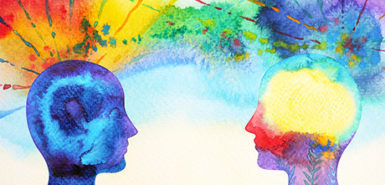
Feeling fed up with Zoom, sweatpants and chapped hands?
So are tens of millions of other people, fighting a syndrome experts have named COVID fatigue.
While this is no time to let our guard down, experts say it’s more important than ever to focus on the many positives.
“Whether it’s learning to savor extra time with family or celebrating all the ways we’ve figured out how to socialize while still keeping our distance, this tough time has taught us all something about our own resilience,” said Lyndsay Volpe-Bertram, PsyD, a psychologist with Spectrum Health.
And as painful, sad and frustrating as it has been, “we’re all part of this collective, character-building experience. As we come through it, it will define who we are for years to come.”
Still, experts say there’s no point in denying just what a wallop COVID-19 has given our collective mental health.
As the pandemic approaches the one-year mark in the U.S., there’s a real sense of exhaustion from the effects of COVID-19 in our lives, said Allyn Richards, PhD, a psychologist at Spectrum Health.
“There’s social distancing, job disruption, the loss of events and traditions and the fear of getting sick,” Dr. Richards said. “We have been in a state of uncertainty and stress for months.”
Some of the more common symptoms? Slacking off on prevention measures. A growing sense of irritability. Feeling hopeless. Drinking too much. Overeating. Trouble concentrating.
The toll of chronic stress
The underlying problem, of course, is that while humans are built to process short-term stress quite effectively, chronic stress is damaging.
It should be as simple as this: An emergency arises. The body triggers a fight or flight response, with surging adrenaline providing the energy to battle a life threat or get out of Dodge.
The heart beats faster. When the threat passes, the body quickly returns to normal, processing the stress hormones required.
But hyper-vigilance about COVID-19 has triggered an epidemic of chronic stress.
The threat doesn’t go away and the body has less chance to recover.
That’s hard on the brain and the body.
“Our stress response has been on overdrive for months now,” Dr. Richards said. “It’s no wonder that we are feeling exhausted.”
Her advice? Start by acknowledging the full range of emotions.
“Including sadness, anxiety, grief and anger,” she said. “All of these are perfectly understandable responses. Trying to ignore and shut down your emotions doesn’t make them go away and can actually lead them to intensify over time.”
In fact, by stuffing your emotions away, you could become prone to an array of unhealthy coping strategies. Some people might turn to alcohol or drugs, or food as a distraction.
So sometimes, just naming and acknowledging your feelings helps.
“Practice talking to yourself as you would a friend and giving yourself compassion, no matter how you feel,” Dr. Richards said.
Another tactic involves reframing your thoughts.
“Our emotional reactions are not produced by a situation itself, but rather the way we interpret the situation,” she said.
For example, some people might keep telling themselves, “We’re going to be stuck in this COVID limbo forever.”
The next time that happens, try to find a different take.
Tell yourself, “All this downtime has given me a chance to focus on sprucing up the house and getting closer to my family.”
Find meaning in actions
When it comes to slacking off on preventive measures, Dr. Richards understands.
After all, who hasn’t occasionally found themselves with a mask around their neck instead of over their nose?
By reminding yourself of the values that inform these measures, you can help keep your mind sharp.
“We are driven by our own values and desires,” she said. “So it’s important to find meaning in the actions.
“Perhaps continuing to remain vigilant is allowing you to protect your family. If you value a sense of freedom, maybe you see masking up as a way to get increased independence sooner.”
She also said it’s smart to keep creating new traditions, even if you didn’t early on in the pandemic.
It’s not too late to schedule a weekly family game night or jump in on the baking, jigsaw puzzle or TikTok dance craze.
And even though Zoom fatigue is real, it pays to stay in contact with others.
“We are wired for social connection—and this helps to buffer stress, which is also why the pandemic has been so difficult,” Dr. Richards said.
Video chats, online support groups and distanced outdoor walks all help.
Step up self-care.
Adequate sleep, healthy meals and regular exercise will help.
“Carve out time each day to engage in relaxation strategies, like deep breathing and mindfulness, including spending time in nature,” Dr. Richards said. “And look for moments of joy and pleasure whenever you can.”
Finally, Dr. Volpe-Bertram said, spend a little time putting the pandemic in perspective.
Amid the losses, it has shown us how fast medicine can move, with the vaccine already available.
“Think about how much despair we were in a year ago—and now we have hope,” Dr. Volpe-Bertram said. “And just as other generations have been defined by difficult events—wars, or the Great Depression—this experience has unified so many of us.”

 /a>
/a>
 /a>
/a>
 /a>
/a>
Thank you for this story. In the fall, I made the decision to start exercising every day as a way of helping to deal with stress. My mom died in December, and I made the decision not to go home for the funeral, to avoid potentially exposing my family, especially my 77 year old dad, to anything I might be carrying. That was very hard. I have really been struggling since then. I am tired of everything covid, anything negative in general. I am still trying to pinpoint what I am feeling in regards to work—but working on that. I try to do something fun for myself once a week, and I continue to watch church services online every week, plus zoom with my Sunday Bible study class. I walk my dog twice a day. This pandemic has been rough.
So sorry for your loss, Twila. This pandemic has been tough on so many, particularly those who have lost loved ones. You have my deepest condolences. Keep up with your ‘taking care of you’ regimen and know we’re all wishing you the absolute best. Hold onto light and hope. #InThisTogether
I am so sorry for your loss. Reading your story my heart goes out to you. Praying for you! Praying you can find Joy in the midst of all that is going on. I think its amazing how you are making an effort to exercise and watch church and surround yourself with positivity best you can.